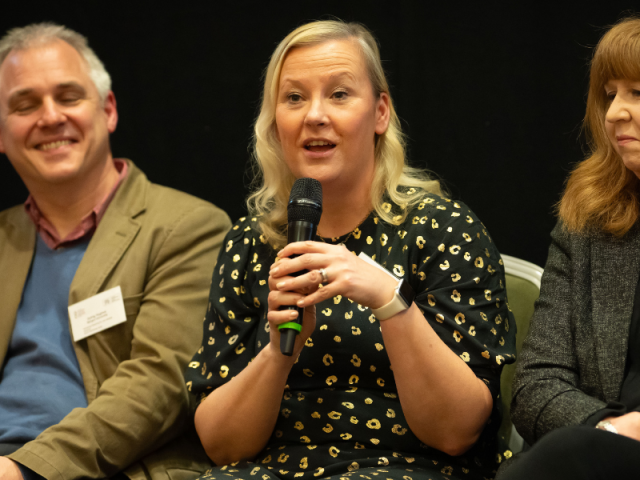
Driving change in social care: Dr Ceryl Davies’ mission to support women and young people
10 October
With a background in law, social work and social policy, Dr Ceryl Teleri Davies has built up 25 years of experience across social care. Now, as a Health and Care Research Wales/ National Institute for Health Research Advanced Fellow, she is dedicated to shaping policy and practice to address sensitive social issues, particularly women’s health and gender-based violence and abuse.
Research beginnings
Dr Davies, now a Senior Research Fellow at Bangor University, initially pursued a law degree but found herself more drawn to social care research. While studying, she did voluntary work in social care and became interested in social work topics like family law and safeguarding. This led her to Leicester University, where she completed a two-year master’s in social work. After qualifying, she worked as a social worker and later as a senior manager in a local authority while also teaching at Bangor University, which she did for six years before pursuing her PhD.
She went on to complete a PhD between 2014 and 2019, focusing on young women’s experiences of abuse in intimate relationships. Her research came before coercive control was even legally recognised.
Despite the challenges of balancing work, family life and research, she describes her PhD as one of the most fulfilling times of her career:
“I loved every aspect of my PhD.”
Bridging the gap between research and practice
One of Dr Davies’ recently finished projects has been her care leavers study on why young adults in Wales disengage from support services after leaving care. This research, which incorporated a podcast titled “Care Leavers: experiences of working with services” to capture care leavers’ voices, aimed to develop practical tools to improve engagement.
The study resulted in the creation of a toolkit co-produced with young care leavers and practitioners. It was officially launched at a symposium in Bangor University, where it received strong support from services eager to implement it in practice. As part of the project’s impact, Dr Davies and her team also delivered six training sessions to help professionals integrate the toolkit into their work.
“The best part of the symposium and the toolkit launch was the interest to apply the toolkit in practice from the attendees.
“The service providers want to know what effective engagement and what a good supportive social worker looks like for young people.”
Groundbreaking research on compassionate care for women
Dr Davies’ latest major project, funded through a Health and Care Research Wales / NIHR Advanced Fellowship, focuses on improving care in cervical screening for women who have experienced sexual violence and abuse. Dr Davies aims to create a model of compassionate care that prioritises the needs of victims.
“I want to influence compassionate care towards women within intimate health screening appointments, promoting low-cost preventative care.
“But I want to have a broader impact and help implement policies transferable to other areas of women’s health and social care.”
This work has garnered international collaboration, bringing together partners from the UK, Sweden, Australia and the US. Dr Davies has also connected with the My Body Back clinic in London, one of the few global models offering specialist maternity and cervical screening care for victims of sexual violence. Dr Davies said:
“I don't think I ever wanted to do anything more than this project.”
Advancing social care research and health economics
Dr Davies is committed to ensuring her research leads to tangible change. Her work has already influenced training programmes, practitioner engagement and the development of evidence-based toolkits. Looking ahead, she seeks to shape policy and practice around trauma-sensitive care, shifting the focus from simply recognising trauma to fostering genuinely compassionate service models.
“I'd like to move to more sensitive practice and more compassionate care, which looks at how the practitioner can change rather than the person accessing support or services.”
Her transition into health economics has further strengthened her mission to measure outcomes in social care. She now has three main goals:
- Enhance social care research in Wales by ensuring social care research has equal standing with health research with an emphasis on connection between research and practice to achieve real-world impact.
- Improve how social care outcomes are measured by creating a model of assessing value and impact, especially in local authorities.
- Advocate for better outcomes for women and young women and work on policy changes to address gender inequalities and violence against women.
Dr Davies has also been awarded the Health and Care Research Wales Faculty Emerging Leaders. This new award, launched as a pilot for 2025/26, was open to Faculty members who have demonstrated a strong track record toward becoming independent researchers. As an Emerging Leader, she will play an active role in building research capacity and capability in Wales. With her passion and commitment, Dr Davies is ready to make a lasting impact on social care research, social care and the lives of its service users.
The Health and Care Research Wales Faculty offers funding to researchers at every stage of their career. After securing the funding, you become a Faculty member and you will have access to mentorship, training and networking opportunities, helping you to develop the skills and confidence needed to design and deliver high-quality research.